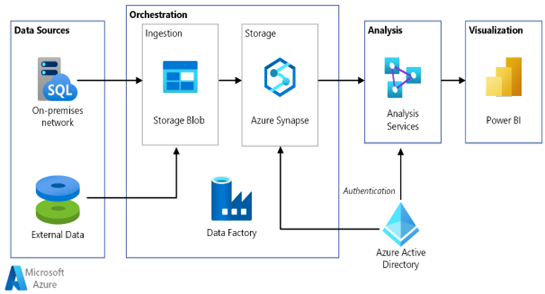Enterprise-wide Analytics implementation for a Pharmaceutical Business

The Pharmaceutical business generates vast amounts of data from various sources, including sales, transactions, inventory management systems, customer interaction, supply chain, manufacturing, and marketing campaigns. One of our clients encountered several data-related challenges such as data fragmentation, inefficient data movement, and lack of data orchestration. To overcome those obstacles and unlock the value of their data, we decided to move to Azure Cloud and implemented Azure Data Factory.
Problem
The client struggled with disparate data sources that hindered their ability to gain a unified view of customer behavior, sales performance, and inventory management. Additionally, manual data movement processes were time-consuming, error-prone, and difficult to scale. The data was scattered across multiple systems, making it difficult to gain a holistic view of the business, also with the increasing number of data breaches, the client needed a secure and compliant way to store and manage its data. The data was growing exponentially, and the client’s existing infrastructure was unable to handle the scale and complexity of the data. So, the client required a solution architecture that could automate data integration, provide seamless data movement and facilitate data orchestration for efficient analytics and decision-making.
Data Solution
DataTheta utilized Azure Data Factory, a flexible and scalable data integration platform that successfully handled their data-related challenges, the key tenets of the solution include
- Data Movement: Azure Data Factory to ingest data from various sources such as Sales databases, inventory management systems, and marketing platforms. Data Factory facilitated efficient data movement across on-premises and cloud storage systems.
- Data Transformation: Using Azure Data Factory’s data flow feature, we performed data transformations, cleansing, and enrichment operations to ensure data quality and consistency. This included mapping data from different sources, applying business rules, and performing aggregations.
- Data Orchestration: Azure Data Factory was used to create and manage data pipelines and data flows. We automated the end-to-end data integration process including scheduling, dependency management, and error handling to ensure the seamless execution of data workflows. The was now centralized and accessible to the entire organization, enabling teams to make data-driven decisions.
- Integration with Other Azure Services: Azure Data Factory was integrated with various Azure services such as Azure SQL Database and Azure Storage for data storage and analytics. It can be integrated with Azure key vault for secrets and key management and Azure Logic App for Specific use cases.
- Data presentation Layer: Data aggregated using the data pipelines were well presented using Power BI to various teams such as the sales group, supply chain group, production planning, etc., to effectively utilize the information about various operations.

Data factory Implementation Along with other Azure services (ref: Azure.com)
Implementation and Benefits
The implementation of Azure Data Factory and other Azure Services yielded significant benefits,
- Unified View of Data: Azure Data Factory facilitated the integration of data from multiple sources, providing clients with a unified view of customer behaviour, sales performance, and inventory management. This enabled the client to make informed decisions based on accurate and up-to-date information.
- Automated Data Workflows: Azure Data Factory automated the end-to-end data integration process, reducing manual effort and improving operational efficiency, ensuring timely data movement and transformation.
- Scalability and Flexibility: Azure Data Factory offered scalability to handle large volumes of data and flexibility to accommodate changing business requirements, Client was able to scale resources based on demand, ensuring efficient data processing and reducing costs.
- Data Security: Azure Cloud provided robust security features, including encryption, identity and access management, and threat detection.
- Data Quality and Consistency: By leveraging Azure Data Factory’s data transformation capabilities, the client improved data quality and consistency. The platform allowed us to apply data cleansing rules, perform validations and enforce data integrity, ensuring reliable insights and analytics.
- Time and Cost Saving: Azure Data Factory reduced the time required for data integration and movement, resulting in faster access to data and accelerated analytics. The automation capabilities of Data Factory also led to cost savings by minimizing manual work and optimizing resource utilization.
Value Creation: DataTheta’s solutions powered by Azure Data Factory from Azure Cloud provided the client with a comprehensive solution for managing and analyzing its data. The client was able to overcome its data-related challenges and achieve significant benefits. Datatheta’s architecture and solutions capability enabled the integration of various data sources seamlessly enabling a rich ecosystem for data processing and analytics. The rich data visualization provided information democratization among various business groups.
Ready to get started?
From global engineering and IT departments to solo data analysts, DataTheta has solutions for every team.
